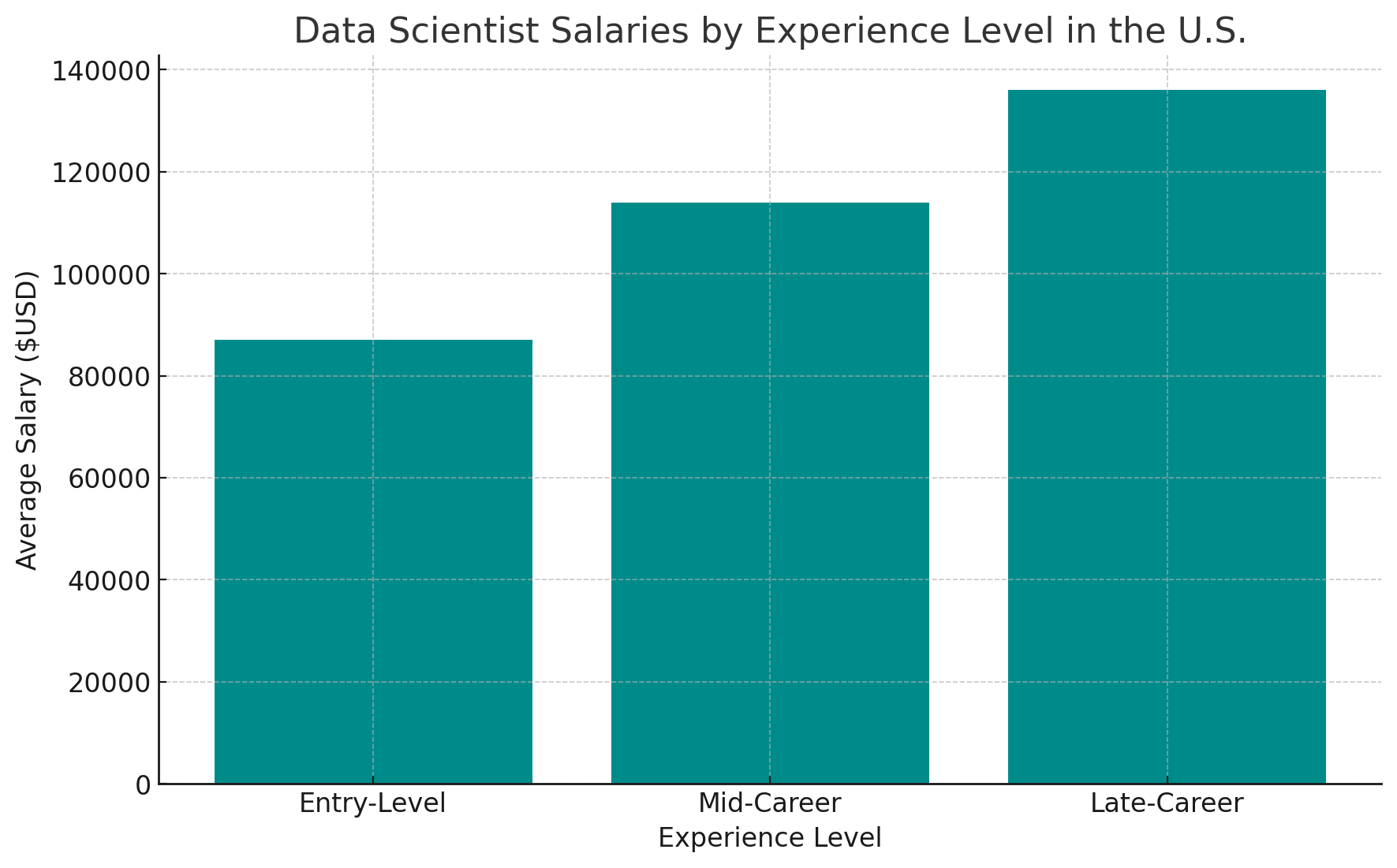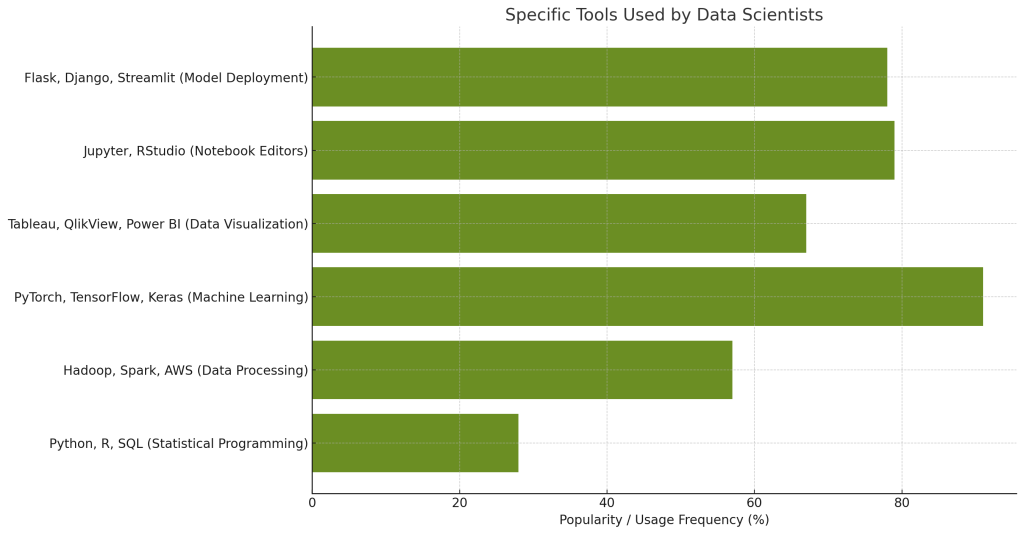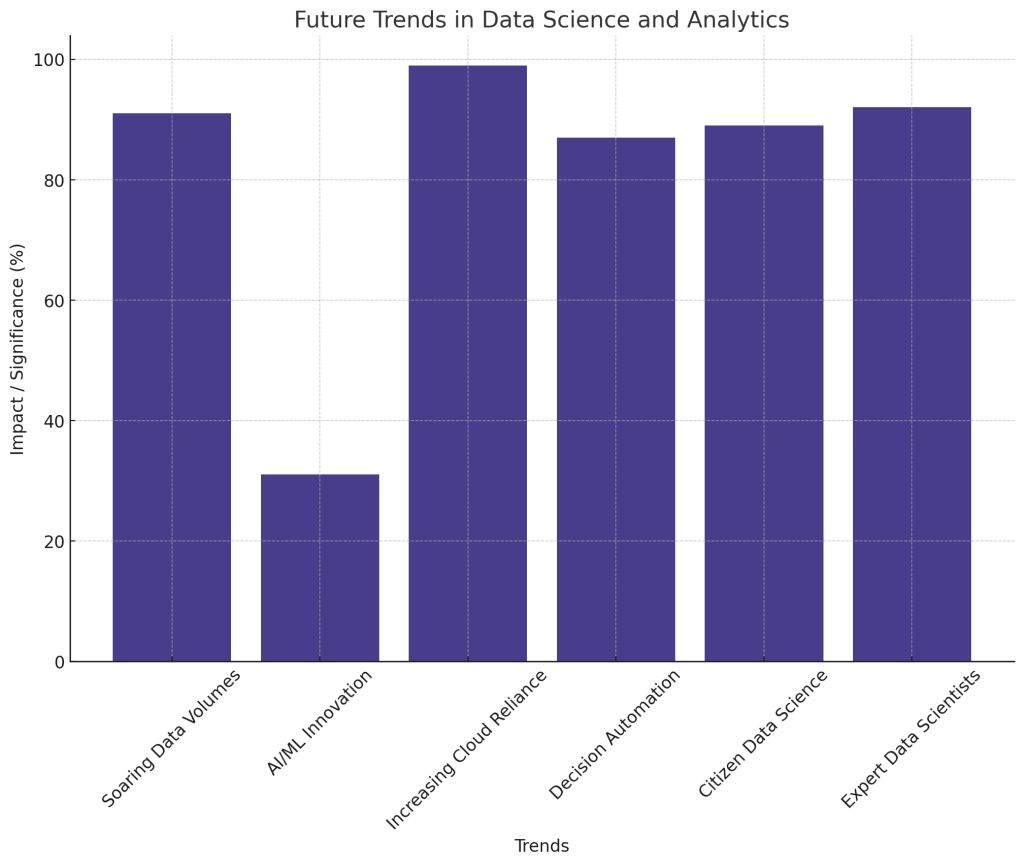
What is Data Science? An In-Depth Look for Aspiring Technology Professionals
Data science is the field of study that focuses on extracting knowledge and actionable insights from raw structured and unstructured data using a blend of mathematical, statistical, computational, and scientific principles and methods. Data scientists utilize programming, data modeling, data visualization, machine learning, and a wide array of tools to uncover hidden patterns and trends that can drive strategic business decisions and solve complex real-world problems across virtually every industry.
A career in data science offers a unique mix of exciting and rewarding experiences, with the opportunity to work at the cutting edge of technology innovation while also delivering practical, tangible value. Data scientists can find diverse opportunities ranging from startups to large corporations, in fields as varied as healthcare, finance, retail, education, transportation, and more. As exponential data growth and artificial intelligence continue to transform the technology landscape, the role of data science becomes increasingly instrumental. The rise of remote work and automation is also opening new pathways for aspiring professionals looking to enter this dynamic, fast-paced field.
Data Science Overview
| Topic | Aspect | Description |
|---|---|---|
| Data Science | Definition | Field focusing on extracting knowledge and insights from structured and unstructured data using mathematical, statistical, and computational methods. |
| Data Scientists | Role | Utilize programming, data modeling, machine learning, and data visualization tools to uncover patterns and trends for strategic decisions. |
| Career Opportunities | Scope | Diverse opportunities in startups, large corporations, healthcare, finance, retail, education, transportation, etc. |
| Skill Utilization | Application | Used in roles like data analyst, machine learning engineer, data engineer, business intelligence developer, data science manager. |
| Industry Employment | Sector Relevance | Employed across technology, finance, healthcare, retail, marketing, government, manufacturing, education sectors. |
| Work Environment | Nature | Collaborative project teams, traditional corporate offices, startup cultures, increasing remote work opportunities. |
| Salary Range | Compensation | Lucrative field; average US base salary of $110,993; potential to exceed $200,000 with experience and specialization. |
What Type of Careers Are Available in Data Science?
Data science offers careers such as data analyst, machine learning engineer, data engineer, and business intelligence developer, each focusing on different aspects of data processing and analysis.
- Data Analyst – Collects, processes, cleans, and performs statistical analysis on data to drive business solutions and insights.
- Machine Learning Engineer – Develops, optimizes, and maintains predictive models and machine learning algorithms to automate tasks and generate insights from data.
- Data Engineer – Builds pipelines and infrastructure for efficient data collection, storage, processing, and analysis.
- Business Intelligence Developer – Creates tools and interactive dashboards to analyze data and communicate data insights to business stakeholders.
- Data Science Manager – Leads a team of data scientists, analysts, and engineers and oversees complex data science projects.
What Industries Employ Data Scientists?
Data scientists find employment in a variety of industries such as technology, finance, healthcare, retail, marketing, government, and education, where leveraging data-driven insights is essential. Nearly every modern industry leverages data science in some capacity. Top employers that use data science include:
- Technology
- Finance and banking
- Healthcare
- Retail and e-commerce
- Marketing and advertising
- Government
- Manufacturing
- Education
How Much Do Data Scientists Get Paid?
Data scientists generally command high salaries, indicative of the specialized nature of their skills and the strong demand for data expertise in the current job market. Data science is one of the most lucrative careers in technology.
Data scientists’ salaries can vary significantly based on factors such as location, experience, and industry. As of 2023, the average total pay for a data scientist in the United States can range between $110,993 and $224,872. In California, a state known for its high concentration of tech companies, the average salary for a data scientist is higher, ranging from $119,403 to $230,673.
For mid-career data scientists in the U.S., PayScale suggests that they can earn anywhere from $71,000 to $138,000, with an average salary of around $100,000. Below is a list of how much data scientists earn depending on experience:

It’s important to note that these figures do not take into account additional compensation such as performance bonuses and other benefits, which can significantly increase the total compensation package for data scientists.
Speaking of – in addition to generous base pay, data science pros often enjoy substantial performance bonuses, equity in early-stage companies, 401k matching, healthcare coverage, paid vacation and parental leave, professional development stipends, and other attractive incentives.
What Skills Should a Data Scientist Have?
A data scientist should be skilled in statistical analysis, programming languages like Python and R, machine learning techniques, data visualization, and database management. Mastering data science requires a diverse blend of specialized technical abilities plus “soft” business and interpersonal skills.
Technical Must-Have’s:
- Statistical modeling, analysis, and inference
- Programming languages like Python, R
- SQL and NoSQL databases
- Data mining, extraction, cleaning
- Machine learning techniques
- Mathematics and linear algebra
- Data visualization best practices
- Cloud infrastructure (AWS, GCP)
- Coding frameworks like TensorFlow, PyTorch, Pandas
Critical Soft Skills:
- Communication – Distill complex results into actionable insights
- Business acumen – Grasp objectives and industry drivers
- Creativity – Approaching problems from new angles
- Collaboration – Cross-functional team coordination
- Project leadership – Coordinate and motivate project teams
Why Are Soft Skills Important for Data Scientists?
While technical abilities are mandatory for conducting rigorous data analysis, “soft” skills determine how (and whether) the generated insights can influence strategic outcomes at an organization. Even the most advanced machine learning models offer little value if the results cannot be clearly translated into impactful business recommendations that leadership can rally behind. Data scientists must also coordinate with diverse contributors and functions to ensure alignment with key growth objectives. Dexterous communication and ability to simplify complex themes for non-technical audiences are paramount strengths for effective data pros.
How Can I Build Data Science Skills?
Building data science skills can be achieved through formal education, online courses, engaging in hands-on projects, and continuous self-education in areas like programming, statistical analysis, and machine learning.
For those pursuing an education in computer science, concentrating coursework on programming essentials, database architecture, statistics, modeling, and data visualization establishes a solid foundation. Gaining proficiency using leading data tools like Python, SQL, Tableau, and TensorFlow should be a priority. Many programs also incorporate projects featuring real-world datasets or case studies to provide hands-on training opportunities. Outside formal instruction, countless free online courses allow virtually anyone to start sharpening their self-education within specialized data science disciplines.
Want To Learn Computer Science From Home?
Jessup University’s Unique Online BS in Computer Science Can Make It Happen!
What Does a Data Scientist Do Day-to-Day?
A data scientist’s daily activities typically involve collecting and preparing data, conducting analyses, creating visualizations, interpreting the results, and communicating these findings. While specific responsibilities vary, most data scientists devote their time across phases of the data analysis lifecycle:
- Framing the Business Problem – Consult with stakeholders and data partners to identify objectives. Document priorities, success metrics, requirements, risks, and assumptions to clearly scope initiatives before analysis commences.
- Data Collection and Preparation – Identify, extract, consolidate, clean, and pre-process all relevant structured and unstructured data needed for the project from the organization’s databases and external sources if required. Resolve any quality issues or gaps.
- Initial Exploration and Visualization – Conduct preliminary analysis through descriptive statistics summaries and data visualizations to surface early patterns, trends, or anomalies that give clues on how to proceed.
- Modeling and Statistical Analysis – Select and train machine learning models, run multivariate tests, leverage predictive modeling, or apply other statistical techniques to gain robust, meaningful, and statistically significant insights from the vetted data relevant to business goals.
- Interpretation and Communication of Results – Interpret the quantitative findings, communicate key takeaways in plain language, illustrate relationships using charts/graphs, address next steps, and issue clear guidance to decision makers.
This lifecycle involves not just strong analytical chops – but also technical programming, creative problem-solving, project leadership, written reports, and public speaking to relay findings.
What Specific Tools Do Data Scientists Use?
Data scientists utilize a variety of platforms, including Python, R, SQL, Tableau, machine learning frameworks, and cloud platforms for data processing, analysis, and visualization. They use a vast array of platforms depending on project particulars, including:
- Statistical Programming – Python, R, SQL
- Data Processing – Hadoop, Spark, AWS Services
- Machine Learning – PyTorch, TensorFlow, Keras
- Data Visualization – Tableau, QlikView, Power BI
- Notebook Editors – Jupyter, RStudio
- Model Deployment – Flask, Django, Streamlit

The list expands nearly every year alongside advances in open-source technologies and cloud-based analytics platforms.
What are Some Key Facts and Trends Shaping Data Science?
Data science is shaped by key trends such as the growing demand for data professionals, advancements in AI and machine learning, and the rising necessity of data-driven decision-making across various sectors. Data science sits at the epicenter of technological innovation and is catalyzing breakthroughs across sectors. A few thought-provoking facts and trends:
- Soaring Demand – Projected to grow 46% by 2026 per USDSI, among the highest for all fields
- Climbing Influence – Increasingly playing central strategic planning role for CXOs/Boards
- Hefty Price Tag – Organizations will spend over $7 billion annually on advanced analytics software licenses by 2026 predicts IDC
- Game Changing Innovation – Quantum machine learning, augmented data management via Foundation Models poised to take capabilities up quantum leaps in power
- Automating the Impossible – Advances in AutoML and MLOPs allow models to build, tune, operate autonomously
How Has Demand for Data Science Changed Over the Past Decade?
The breadth of applications for sophisticated data analytics has exploded over the past 10 years across virtually every industry. Per LinkedIn’s 2022 emerging jobs report, demand has increased over 650% since 2012 – outpacing all other technology and analytical fields. The rapid pace of innovation shows no signs of slowing as companies and institutions race to monetize information and establish data-centric competitive advantages.
Which Industries Are the Fastest Adopters?
The technology, finance, healthcare, and e-commerce industries are among the fastest adopters of data science, rapidly integrating data analytics for innovation and operational efficiency.
Media, insurance, education, and government are also presently undergoing massive digital transformation initiatives to leverage analytics in new ways. Customer-centric sectors like retail and hospitality also continue heavy investments into ML/AI to personalize experiences. And breakthroughs in pharmaceutical data science are revolutionizing R&D, clinical trials, and patient health monitoring.
What Does the Future Look Like for Data Science and Analytics?
The US Bureau of Labor Statistics predicts that by 2026, there will be 11.5 million jobs in data science and analytics. The field of data science research is expected to grow at a 22% rate from 2020 to 2030, and the market is expected to witness a growth of 46% in employment opportunities for data scientists by 2026. Key drivers stoking enthusiasm include:
- Soaring Data Volumes – New ingestion and analysis demand as data proliferation grows at astounding 40%+ CAGR next 5 years
- AI/ML Innovation – Explosion in “smart data” fueling new predictive possibilities
- Increasing Cloud Reliance – Lower barriers accelerating advanced analytics adoption among mid-market firms
- Decision Automation – Natural next phase as data-centric thinking takes hold is automating actions based on insights
- Citizen Data Science – Scaling expertise through intuitive tools allowing novice users to leverage analytics
Expert data scientists – especially those with specialized domain knowledge – will play pivotal roles leading corporates into an enlightened, evidence-based future by crafting the tools and developing elite machine learning algorithms which fuel evolution.

Which Innovations Have the Greatest Disruptive Potential?
We’ve only scratched the surface of generative AI applications, where models create entirely new realistic data. Large Language Models also portend automation across a variety of writing-based occupational tasks. On the technical side, innovations in MLOps, distributed computing frameworks like Kafka and Ray, and new techniques like reinforcement learning promise to unlock additional capacities. Edge computing breakthroughs could also push more processing directly where data is created. And we may see entirely new specialties at the intersection of data science and disciplines like neuroscience or genomics emerge.
How Might Data Regulations Evolve Over the Next Decade?
Protecting consumer privacy will progress as a key theme, although approaches vary widely globally, making compliance expensive for multinationals. To balance privacy with utility, techniques that anonymize data early in the pipeline such as aggregation or adding “synthetic” records represent promising directions. Rules mandating responsible AI practices and adherence to ethical principles will also likely expand. Overall corporates must invest now in governance, explainable AI, and provisions to eliminate bias if models materially impact individuals. Getting ahead of these trends is wise.
Jessup University’s Computer Science Degree: Where Faith and Data Science Intersect
Jessup University’s Computer Science degree program offers a robust curriculum fusing technological skills and Christian values. With emphasis on blending theory and hands-on learning, the program equips students with both the core foundations and practical abilities to prepare them for vocations in the tech sector.
What is computer science? It’s the field of study that focuses on computation, information, and automation using computers and computational systems. It’s the backbone and foundation behind software engineering, and can lead you many directions within the tech space.
Specializations offered include:
- Cybersecurity: involves the protection of computer systems and networks from information disclosure, theft, or damage to hardware, software, and data, as well as from disruption or misdirection of services provided.
- Data Analytics: refers to the process of examining data sets to draw conclusions about the information they contain, using specialized software and systems for analysis, data visualization, and decision-making.
- Data Science: encompasses a multidisciplinary approach to extracting knowledge and insights from structured and unstructured data, using techniques from statistics, big data, computer science, and information technology.
- Information Technology: concerned with the use of systems, especially computers and telecommunications, for storing, retrieving, and sending information, playing a crucial role in the operations of modern organizations.
- Software Engineering: What is software engineering? It’s the systematic development and application of engineering approaches to the design, development, maintenance, testing, and evaluation of software.
Core courses cover crucial competencies like programming, algorithms, mobile computing, AI, and database systems. The faith-based educational approach promotes ethics and accountability in applying technical knowledge. With small class sizes and mentoring support, students can thrive in their academic and professional aspirations.
The program is designed to deliver transferable skill sets allowing graduates to adapt throughout evolving technological landscapes. Students also gain access to internships, industry connections, and postgraduate employment opportunities in their study of computer science. We also offer online classes as well as in-person on-campus.
Data Science Career and Education
| Topic | Aspect | Description |
|---|---|---|
| Data Science Careers | Types | Data Analyst, Machine Learning Engineer, Data Engineer, Business Intelligence Developer, Data Science Manager. |
| Work Activities | Daily Tasks | Data collection/preparation, exploratory analysis, modeling, statistical analysis, interpretation, and communication of results. |
| Salary Expectations | Industry Variations | High in technology sector ($140k median); finance, healthcare, media, retail also pay handsomely. |
| Additional Benefits | Financial Perks | Performance bonuses, equity, 401k matching, healthcare, paid leave, professional development. |
| Technical Skills | Core Competencies | Statistical modeling, programming (Python, R), SQL/NoSQL databases, machine learning, data visualization, cloud infrastructure. |
| Soft Skills | Complementary Abilities | Communication, business acumen, creativity, collaboration, project leadership. |
| Jessup University Program | Education Focus | Offers in-depth program in computer science with specializations in cybersecurity, data analytics, data science, information technology, software engineering. |
Looking to Become a Data Scientist?
With exponential data expansion and continuous AI innovations, data science offers a rewarding lifelong career at the spearhead of technological revolution. Data-driven decisions are becoming central at forward-thinking institutions, making highly skilled talent more crucial than ever. Jessup University develops graduates not just to capably handle complex data but also apply knowledge morally and ethically to uplift their organizations.
Explore our hands-on Computer Science program to gain real-world expertise at the intersection of computing technologies and timeless Christian values – and prepare to make your mark.
Contact Jessup University today for more information!
Want To Learn Computer Science From Home?
Jessup University’s Unique Online BS in Computer Science Can Make It Happen!
